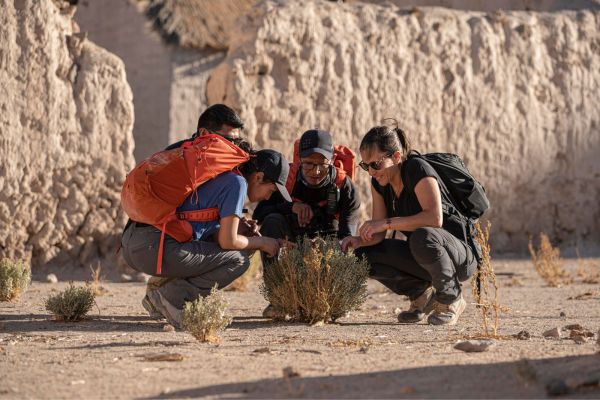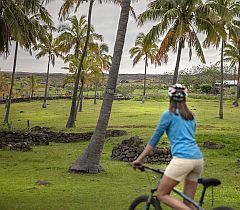An ancient route across the Bolivian highlands
The Travesía Atacama Uyuni that Explora offers is a profound journey into the Andean highlands; an immersion in the region that is only possible thanks to years of work with local native communities.

The road that connects San Pedro de Atacama in northern Chile and the Uyuni salt flat in Bolivia is a transit area with thousands of years of history. It has been traveled by native Andean peoples since nomadic times, as they sought food and raw materials. And today it receives visitors from all over the world, who are moved by the unique geography and culture.
On the trip between the two points, travelers cross the driest part of the Atacama Desert, in turn the driest desert in the world, and enter the Andes Mountains highlands. It is a plateau at close to 4,000 meters above sea level, an altitude only surpassed by plateaus in the Himalayas, and it contains attractions that are as unique as they are impressive.
Its lagoons with their intense colors and large populations of pink flamingos are an example. And there are the geysers, openings in the ground that spew hot water and steam; and the white and bright Uyuni salt flat, a plateau covering 10,000 k2 with 32 islands inside. The sky steals the show after sundown, as this is the best place in the world for stargazing.

An in-depth approach
There are multiple ways to discover this highland region, but to immerse oneself in its full magnitude one needs to revisit ancestral trails across territories that belong to native communities to this day.
For this reason, compliance with the Bolivian state’s regulatory framework is just the starting point for Explora. Its proposition is to provide in-depth approach to territories, an immersion into their geographies and cultures that can only be achieved through cooperation with local communities.
Explora offers a journey that can begin at its lodge in San Pedro de Atacama or the one in Uyuni. In between, travelers stay at the two Mountain Lodges in Ramaditas and Chituca, comfortable shelters created to rest, dine and contemplate the surroundings.
Installing these Mountain lodges in these extreme areas was a complex task that entailed building trust with local communities to work together. The goal was clear: to make travelers feel like guests rather than intruders.

Cooperation
“Ultimately, trust in the people who undertake enterprises is the cornerstone of all relationships. It takes many hours of conversation to forge a human relationship, not a merely monetary one,” says Explora Sustainability Manager Juan Marambio, who worked with Destination Manager Arturo Rosas to develop the Travesía Atacama-Uyuni.
The latter recalls that building this relationship with the community took years of work, small steps: “Sharing over lunch or a beer, participating in their ceremonies and customs, such as pijchar, or chewing coca.”
Marambio adds that, after establishing a personal bond, they spent many hours explaining their project in detail to dispel any fears. Thus, they managed to eradicate the stereotype of the large disruptive hotel and install the reality of their Mountain Lodges: light shelters with 4-6 rooms that seek to intervene in the landscape as little as possible, so much so that they can be dismantled. Arturo sums up the fundamental aspect of the whole process: “Being sincere and clear.”

In house
Iris Nina is 38 years old and was born in Jirira, where the Uyuni lodge is located. She lived there until she was 4 and, like many of the community’s members, went to La Paz with her parents so they could work in the city. They would only return to Jiria two or three times a year to look after their quinoa plantations.
Explora’s arrival in the region has led to the return of many community members, who now find work in their hometown. Irisi is among them: “Thanks to the hotel I came back to be with much of my family and now we are very close. We are recognizing part of the culture that was being lost.”
In addition to the lease on the land, Explora and the local community agreed to a commitment to buy their products and hire its members to operate the hotel. And for Explora, beyond commitments these are opportunities to add value to the traveler’s experience.

Each lodge is operated by “camp staff” who receive travelers after their explorations. They take care of cooking, service and maintenance, with Explora’s teams as backup. Iris is a camp staff member and particularly enjoys dealing with travelers. “I like to talk, to make them feel comfortable, in confidence,” she says.
The culinary proposition was created with the advice of Ancestral, the award-winning restaurant in La Paz, which is where the camp staff received their training. The menu at the lodges reflects the region’s ingredients and recipes, taken to their maximum expression. As a representative of her community, Iris is the one to present the food.
“Tonight, we are going to eat Chicken Sajta,” she explains spiritedly opposite the travelers’ table, “It is chicken cooked in yellow chili. It comes with a short pasta that we roast first. When it takes on a golden color, you add it to the boiling water with salt and that gives it a unique flavor that is different from traditional pasta. We accompany it with chuño, potato flour with cheese and egg batter.”
Iris appreciates the revival her town has experienced since the lodge was created and comments that the inhabitants are even in the process of reopening the Jiria primary school, which had been closed because most of the children had migrated. “Explora came to be part of the community,” she summarizes.

